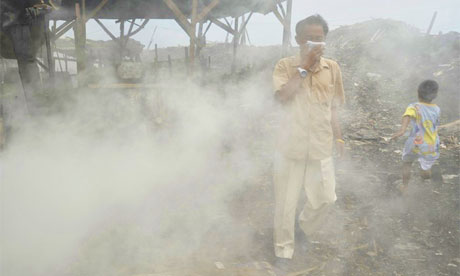In a wretched corner of the Manila Bay waterfront, 300 families scratch a subsistence out of making charcoal. Now even that living is threatened.
For nearly 10 years the workers of Ulingan squatter community in Tondo on Manila Bay have earnt a scant income making charcoal.
To most people their working and living conditions would be intolerable.
About 300 families live in huts made from scavenged materials at one end of a 250 meter strip of land tucked in behind a fetid rubbish dump.
They work at the other end of the plot where dozens of charcoal pits belch acrid smoke, the ground is thick coal-black mud and the heat sweltering.
An average day’s work yields around 70 pesos ($1.60).
Now, with the site earmarked for development, even that meagre livelihood looks set to be snatched away.
Raffy Texon, of Ecoshield Foundation, based in the Metro Manila financial district of Makati, says he wants everything removed from the site within a month, community organizers say.
The community can do little except appeal to Texon’s goodwill to allow them the use of a small portion of the land to continue their work.
“We’re not moving out as we have nowhere else to go,” says Vic Sucion, head of the community association. “What we are doing now is looking to make alliances with other groups to lobby to be able to stay here
“All we need is a quarter of the whole three-hectare site.”
Sucion is one of 38 original squatters who set up the community, known also as Barangay [village] 105, in 2000. Some were scavengers at the notorious Smokey Mountain dumpsite nearby, others came from the provinces seeking a better life in the city, a search that proved elusive.
Health problems are many. Estimates suggest 60 per cent of the population has tuberculosis while other lung problems, due to the ever-present smoke, and water-borne diseases are commonplace.
“My baby is just one year old. He has TB and other lung troubles. I gather nails and scrap metal left behind after the charcoal is made to buy medicine for him,” says Janet Ignacio, who has two other children aged seven and 10 and a persistent hacking cough of her own.
Given the chaos that surrounds it, the charcoal production itself is surprisingly well-organized. Timber is stacked neatly in the shallow pits, covered with soil and corrugated iron and burnt slowly. The process takes three days before the finished product is bagged ready for sale.
The market is booming, as rising costs of other fuels drive many back to cooking over charcoal. But the economics for the people of Ulingan are less compelling.
Input costs are high. Timber for one pit costs around 11,000 pesos, the money borrowed from loan sharks at 20 per cent interest a month.
Net income from one pit is around 3,000 a week but this is divided among several families.
That is supplemented by the women and children who sift through the ashes after the charcoal is made looking for nails, old hinges and wire that the sell for scrap. One person can make 20 pesos a day in this way.
“Look at these kids sifting through the ashes for nails like they are prospecting for gold,” says the young community organizer Marlon Llovido, a former seminarian who left to start working with the people’s organization.
He came to his work in Ulingan through a former Jesuit priest Dennis Murphy.
Llovido has a dream to revolutionize the lives of the charcoal makers if he can persuade Texon to donate some land and can raise a million pesos to introduce new, cleaner more productive charcoal burners.
“I have seen the new technology at a plant in Cavite [a province at the southern end of Manila bay],” he says.
“I want to replicate that here and a businessman has already arranged to have the designs made for me.”
The new technology, consisting of concrete igloo-shaped burners, is much cleaner. There are few noxious fumes as the smoke is condensed and the water extracted in the process can also be sold to treatment plants.
“We could achieve the same production as now with just 10 of the new plants,” says Llovida. “Each of the new plants can produce 60 sacks of charcoal.”
An initial pilot project of three to four burners would cost one million pesos. The fullscale project, three million, around US$69,000. Raising that sort of money is easier said than done, Llovido has discovered.
“We are still looking for funds. We met Cardinal [Gaudencio] Rozales [Archbishop of Manila].
“He likes it and said he would recommend it to the local authorities.
“In fact, we introduced several programs for the poor to the cardinal and he was only interested in the charcoal making, so we are hopeful,” says Llovido.
His program would also provide capital for the charcoal-burners to buy their raw materials without falling into debt with the money-lenders but he is far from certain he will be able to raise the necessary funds.
“So much money is stolen through corruption by politicians and the military and so little is needed here,” says Llovido.
“Even the church has a very limited engagement with the poor. That’s the way I see it.”
This article first appeared in ucanews.com.
Republished with permission
Photo Gallery
Photograph ©Michael Coyne
News category: Features.




